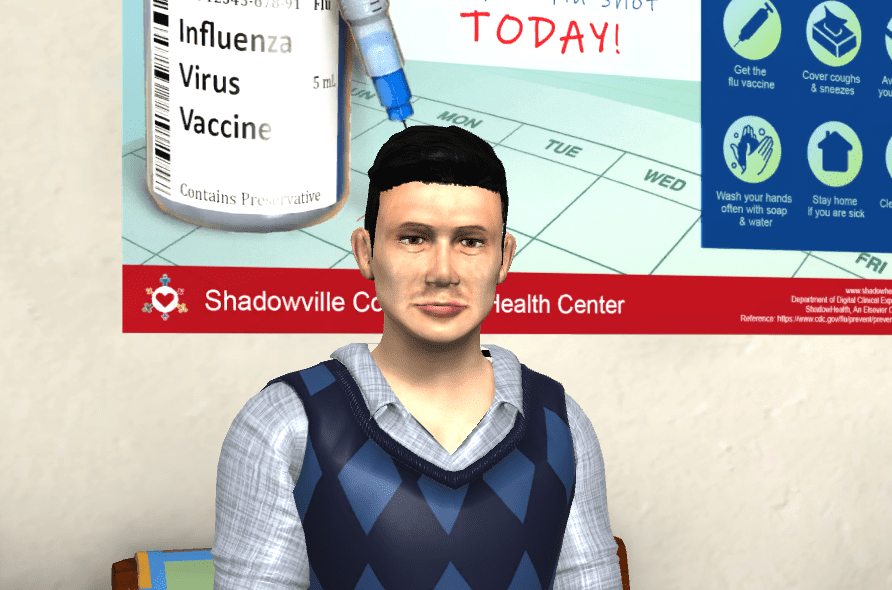Shadow Health Papers

Quan Van Tran Shadow Health Assessment
When students first meet Quan Van Tran, 50 years old, they meet him in a medical setting shortly after he’s found out he has HIV. Quan is from Vietnam and now lives in the United States. Research from previous years shows that more Asians in the U.S. were diagnosed with HIV, and 1 out of 5 Asians who had HIV didn’t know they had it. Quan doesn’t define himself by his sexual orientation. He’s given a task to help students show respect for different cultures. HIV is a sensitive topic, and it might be hard for new nurses to learn the detailed history needed for tracking contacts. He’s part of the Community Health DCE.
When students ask about a patient’s sexual history, it’s not okay to ask Quan to label his sexual orientation, and he’ll resist if they keep asking inappropriate questions about his identity instead of focusing on the right questions about his sexual history. This feature in Shadow Health makes students think hard about how to ask about patient history and get relevant medical information.

Struggling to meet your deadline?
Get your assignment on Quan Van Tran Shadow Health Assessment done by certified MDs and PhDs in the USA. ORDER NOW!
Research shows that nurses often aren’t trained well enough to provide good care to LGBTQ+ people. It was important to the Shadow Health team to highlight a specific group that’s often left out or not understood. They worked with a nursing expert from the Vietnamese American Nurses Association to create this character. Quan’s profile as an older Asian American man represents a group that’s seeing more new HIV cases but isn’t getting enough attention in healthcare education.
Also, Shadow Health did research recently, and it was published in Clinical Simulation in Nursing. They wanted to know if virtual patient simulations could help nursing students learn about issues they might not see in their regular training. They focused on a patient with HIV because people with HIV often face discrimination and stigma. The findings show that taking part in a virtual simulation with an HIV-positive patient can make nursing students more understanding and positive toward these patients.
Quan Van Tran Shadow Health Assessment
When students first meet Quan Van Tran, who is 50 years old, they meet him in a medical setting shortly after he has found out he has HIV, a serious health condition. Quan originally comes from Vietnam and now lives in the United States. Some studies from past years have shown that more Asians living in the U.S. were diagnosed with HIV, and shockingly, 1 out of every 5 Asians who had HIV didn’t even know they had it. Quan doesn’t really think about or identify himself based on his sexual orientation, which means he doesn’t see himself as specifically gay or straight. His main task is to help students learn to respect and understand different cultures, which is very important in healthcare. Dealing with HIV is sensitive, and it might be hard for new nurses to learn all the detailed history needed to track down who might also have the virus. Quan is a part of a program called Community Health DCE, where students learn about community health.
When students ask patients about their sexual history, it’s not polite or appropriate to ask Quan to define or label his sexual orientation. He’ll resist or push back if they keep asking wrong or rude questions about who he is instead of asking the right questions about his sexual history. This feature in Shadow Health, a program for teaching nursing, is designed to make students think carefully about how to ask patients about their medical history and get the information they need.
Research shows that many nurses don’t have enough training to give good care to LGBTQ+ people, which stands for lesbian, gay, bisexual, transgender, and queer, among others. This was important for the Shadow Health team to highlight, so they chose to focus on a specific group that often doesn’t get enough attention or understanding. They worked with an expert nurse from the Vietnamese American Nurses Association to create Quan’s character. Quan is an older Asian American man, and this group is seeing more new HIV cases but isn’t getting enough attention in nursing education.
Also, Shadow Health recently did some research, and they published their findings in a nursing journal called Clinical Simulation in Nursing. They wanted to see if using virtual patient simulations could help nursing students learn about issues they might not usually come across in their regular training. They focused on a patient with HIV because people with HIV often face discrimination and being treated badly by others. What they found was that taking part in a virtual simulation with a patient who has HIV can actually make nursing students more understanding and positive toward these patients.
Quan Van Tran Shadow Health Assessment
When students first meet Quan Van Tran, 50, they encounter him in a clinical setting shortly after he has received a positive diagnosis of HIV. Quan is a Vietnamese American who immigrated to the United States. In previous years, research shows the number of HIV diagnoses among Asians in the U.S. increased, and 1 in 5 Asians living with HIV in the U.S. did not know they had it. Quan also does not think of himself in terms of sexual orientation. His assignment is imbued with a need for students to demonstrate cultural humility. HIV is a sensitive topic and the depth of history required for contact tracing may also be challenging for new nurses. He is featured in Community Health DCE.
When obtaining a patient’s sexual history, it would be inappropriate for students to ask Quan to think of himself in terms of his sexual orientation and will push back if students continuously ask inappropriate questions about his identity instead of appropriate questions about his sexual history. This is a feature in Shadow Health that makes students think carefully about obtaining patient history and obtaining medically relevant behavior.
Studies show nurses often lack the proper education to adequately provide safe and competent care to the LGBTQ+ community (Kroning et al., 2018). It was important to the Shadow Health team to call attention to a specific vulnerable and underrepresented population. This character was developed with a nursing expert from the Vietnamese American Nurses Association. His demographics as an older Asian American man represent a growing population for new HIV infections, which is underrepresented in healthcare education.
Additionally, Shadow Health recently conducted research, published in Clinical Simulation in Nursing, to determine if virtual patient simulations can effectively teach nursing students about patient care issues they may not encounter as part of their clinical education. The team focused specifically on a patient living with HIV, recognizing that people living with HIV face stigma and discrimination in society at large and in the healthcare system itself. Findings suggest that participation in a virtual simulation of a patient living with HIV can positively impact nursing students’ attitudes.

Dont wait until the last minute.
Provide your requirements and let our native nursing writers deliver your assignments ASAP.
Simulations in Shadow Health
- Undergraduate DCE: Community Health DCE